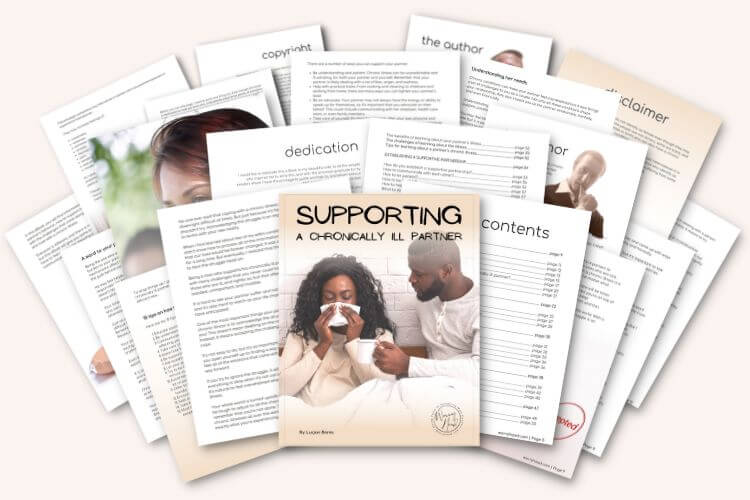Does too much caring cause compassion fatigue?
When you care for a chronically ill partner, and you care too much, it can lead to compassion fatigue. This is where your own needs start to suffer because you are so focused on caring for the other person. So if you asked me “does too much caring cause compassion fatigue” my answer is a definite YES.
Caring too much causes compassion fatigue because you are constantly giving without receiving anything in return. This can be emotionally and mentally draining, leaving you feeling exhausted. Compassion fatigue is caused by sacrifices made, such as giving up your hobbies and interests.
How do you know if you experienced compassion fatigue?
Compassion fatigue is a state of physical, emotional, and mental exhaustion that can be caused by caring for someone who is chronically ill. When you are constantly giving of yourself, without taking time to replenish your own energy, it can lead to compassion fatigue.
Compassion fatigue occurs when you feel helpless, hopeless, or powerless. You feel irritable, angry, and even resentful. Your pleasure in activities is decreased. You know your partner suffers and feel anger when someone or something causes their suffering.
When as the caregiver you feel helpless, powerless, and hopeless to relieve your partner’s suffering, you may start to feel like giving up. This can lead to resentment and even physical and emotional abuse.
Feeling irritable isn’t uncommon, it’s a sign that you are no longer enjoying activities that you once found pleasurable. This can be a result of your partner’s illness taking over your life. When that happens you need to try and find ways to enjoy your hobbies and activities again, even if it’s just for a short period of time.
If you want to learn how to cope with your partner’s chronic illness, how to support her struggles, and manage a relationship with a chronic condition, I give away a FREE Chapter of my eBook: “Supporting a Chronically Ill Partner”.
This chapter alone has all the comprehensive information about acknowledging the struggles, including:
- A word to your partner.
- A word to you.
- Stepping on eggshells.
- Understanding her needs.
- How to acknowledge having a chronically ill partner?
- Acknowledging can be hard.
- 15 tips on how to do it!
Get the 1st Chapter FREE!
Chronic Illness for Partners

Sacrifices and compassion fatigue.
I sacrificed a lot taking care of my wife, and my optimism blinded me to the reality that I was slowly killing myself. I became consumed with her needs and stopped living my own life.
I gave up my frequent workouts, I used to go to the gym 7 days a week, but today, I don’t go at all. My wife feel sorry and was responsible for that and bought me on my birthday 30kg weights. And even though I’m extremely grateful for that, it is not the same as the gym.
Being dancers, we both have given up on teaching and performing. Sure, we still dance, but it is more for health reasons and fun. Nevertheless, I miss competing and performing.
But making sacrifices, I’ve learned to appreciate life more.
I’ve learned what compassion fatigue and caregiver burnout were, and how to avoid them. If you are in a relationship with a chronically ill partner, here’s what you need to know about compassion fatigue, and how to prevent it.
According to this source, “Compassion fatigue can be defined as the feelings of frustration and exhaustion when a care partner experiences self-blame and loss of energy due to caregiving”.
But I am not talking about caring for the elderly, I’m talking about chronic illness and compassion fatigue. Too much caring causes compassion fatigue when you care for someone with chronic conditions.
Chronic illness and compassion fatigue.
What’s the difference between caring for the elderly and caring for your partner?
The difference is in your relationship. Caring for elderly people like your parents is different from caring for your intimate partner. The difference lies in the emotional connection that you have with your partner. When you are emotionally connected to someone, it can be harder to see them suffer.
It’s also difficult to take care of yourself when you’re taking care of a partner. You might not have time for your own hobbies or interests. You might not even have time for your own health.
This can lead to compassion fatigue.
And when you care for a chronically ill partner, you might see them suffer more than other people. This can be hard to watch. You might feel like you can’t do anything to help. Especially if you are a man and your partner (female) has endometriosis.
With endometriosis, your compassion fatigue might be caused by:
- feeling like you can’t do anything to help
- seeing your partner in pain and not being able to do anything about it
- feeling helpless and hopeless
- feeling like you’re not doing enough
These are just some of the ways that compassion fatigue can occur in a relationship. It’s important to remember that you are not alone. Many people feel this way when they are in a relationship with a chronically ill partner.
If you are experiencing compassion fatigue, there are things that you can do to help yourself.
- Talk to someone who understands. Find a support group or therapist who can help you process your feelings.
- Take time for yourself. Make sure that you are taking care of yourself, both physically and emotionally. This includes getting regular exercise, eating a healthy diet, and getting enough sleep.
- Set boundaries. When you’re taking care of a partner, it’s easy to forget about your own needs. Make sure that you are setting boundaries and taking time for yourself.
- Seek professional help. If you are struggling to cope, seek out professional help. This can be a therapist, counselor, or doctor.
Compassion fatigue is a real phenomenon that can occur in any relationship. If you are struggling, reach out for help.

How to prevent compassion fatigue?
The first step to preventing compassion fatigue is to understand what causes it. Once you know the signs to look for, you can take steps to avoid them.
There are three main reasons why caring too much can lead to compassion fatigue:
- You try to do too much.
- You take too much on yourself.
- You’re not getting support.
1. You’re trying to do too much.
If you’re trying to do everything for your partner, you’re going to burn out quickly. It’s important to delegate some of the tasks so that you can take a break. Let others help you with caregiving duties, and don’t try to do everything yourself.
2. You’re not taking care of yourself.
If you’re not taking care of yourself, you won’t be able to take care of anyone else. Make sure you’re getting enough sleep, eating right, and exercising. It’s also important to find time for yourself, to do things that make you happy.
3. You’re not getting support from others.
It’s important to have a support system to help you through tough times. If you’re feeling isolated, reach out to friends and family. There are also many support groups available for caregivers.
If you’re starting to feel compassion fatigue, there are some things you can do to help yourself:
- Take a break. It’s important to take some time for yourself, even if it’s just a few minutes each day. Take a hot bath, read your favorite book, or go for a walk.
- Delegate some of the tasks. There’s no need to try to do everything yourself. Ask friends and family to help with caregiving duties.
- Seek out support. Talk to someone who understands what you’re going through. There are many support groups available for caregivers.
- Seek professional help. If you’re feeling overwhelmed, seek professional help. A therapist can help you deal with the stress of caregiving.
Compassion fatigue is a real problem for caregivers. As a result, your health may deteriorate, and you can become depressed. You don’t want to go far down the rabbit hole.
If you are in a relationship with someone who is chronically ill, it is important to find a balance between taking care of them and taking care of yourself. Otherwise, you will end up with compassion fatigue, and your own health will suffer as a result.
If you find yourself in this situation, it is important to take a step back and assess the situation.
Why does caring too much cause compassion fatigue?
Caring too much can lead to burnout because you are constantly giving without receiving anything in return.
This can be emotionally and mentally draining, leaving you feeling exhausted. It is important to remember that you cannot pour from an empty cup. In order to be able to care for others, you need to make sure that you are taking care of yourself first.
But if you feel exhausted, which is a symptom of caregiver burnout, how do you know if you have it? What is the difference between compassion fatigue and caregiver burnout?
Compassion fatigue and burnout.
The difference between caregiver burnout and compassion fatigue is that burnout is more about the physical and emotional exhaustion that comes from taking care of someone.
Compassion fatigue, on the other hand, is more about the mental and emotional exhaustion that comes from constantly caring for others. It is important to remember that both are serious problems that can have a negative impact on your health.
What causes your partner compassion fatigue?
There are many reasons why your partner may start to experience compassion fatigue. If they are constantly caring for you or someone else, they may start to feel overwhelmed. Other causes can include stress, anxiety, and depression. If you notice that your partner seems to be struggling, it is important to have a conversation about it. They may need more help than you realize.
Does too much caring cause compassion fatigue? Yes, and it is a real problem that can have a major impact on your life. If you find yourself in this situation, don’t be afraid to reach out for help. There are many resources available to you.
Talk to your doctor, a therapist, or even a close friend. They can offer support and guidance as you navigate this difficult time.
Conclusion.
- Are you still able to take care of yourself?
- Do you have time for your own hobbies and interests?
If not, then it may be time to reevaluate your priorities, because caring for someone with a chronic illness, you may be at risk for compassion fatigue. Being there for your loved one is important, but it’s also crucial that you take care of yourself.
This can be a difficult balance to find, but it’s so important.
If you find yourself feeling overwhelmed, talk to somebody who understands what you’re going through. There are many support groups available for caregivers.
Taking some time for yourself is also essential. Even if it’s just a few minutes each day, make sure to do something that you enjoy and makes you feel good. It’s important to recharge your own batteries so that you can be there for your loved ones when they need you. If you don’t take care of yourself, you won’t be able to take care of them.
Lastly, don’t be afraid to ask for help from friends and family. It’s okay to delegate some of the tasks involved in caregiving. You don’t have to do it all by yourself.
I hope this article helped you answer your question “does too much caring cause compassion fatigue”. If you have any tips or questions, don’t hesitate to connect in the comments section below.
Get the 1st Chapter FREE!
Chronic Illness for Partners



About Me
Hi, I’m Lucjan! The reason why I decided to create this blog was my beautiful wife, who experienced a lot of pain in life, but also the lack of information about endometriosis and fibromyalgia for men…
